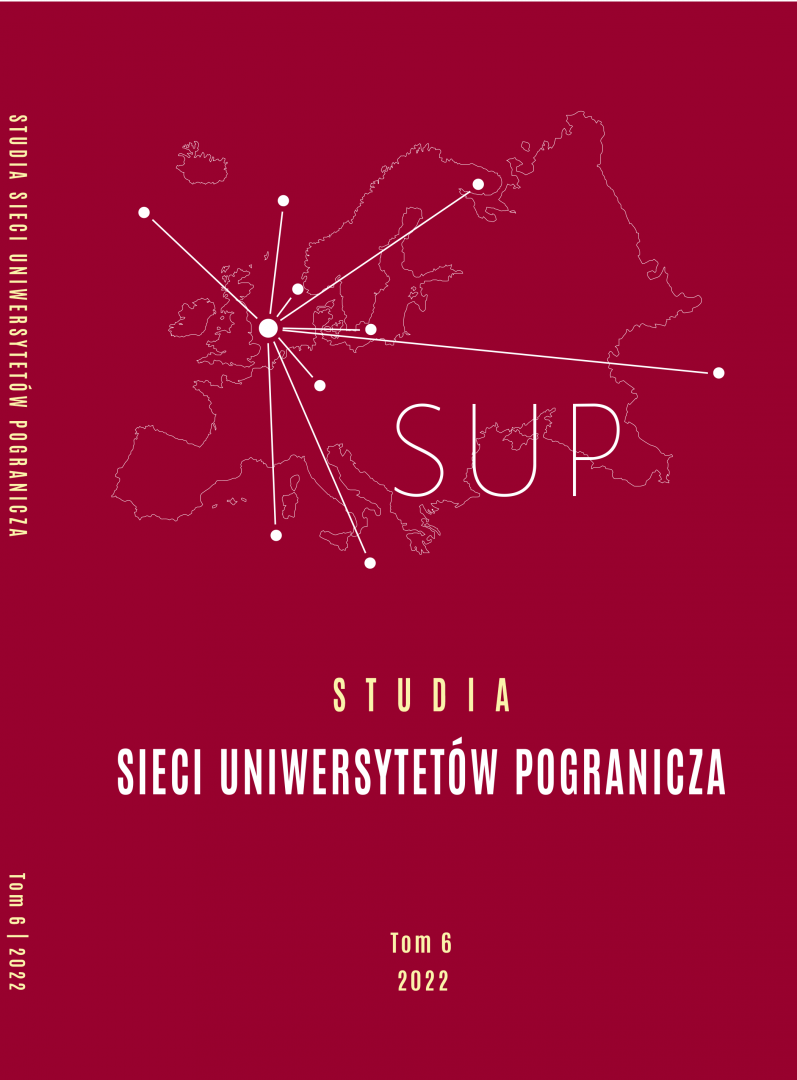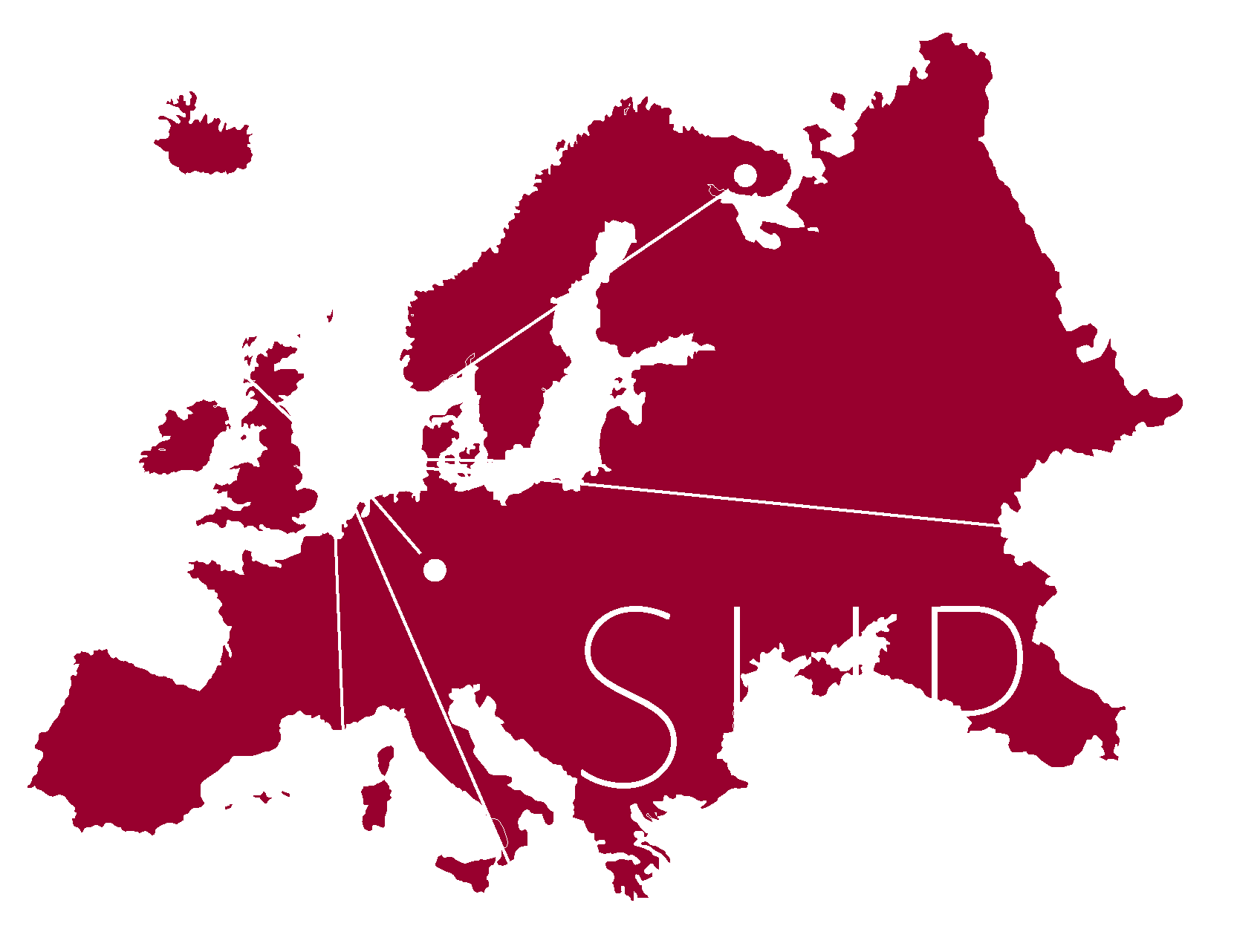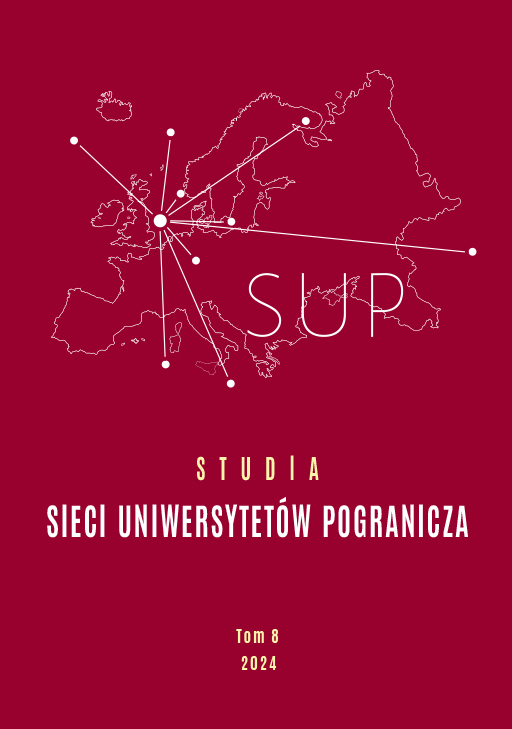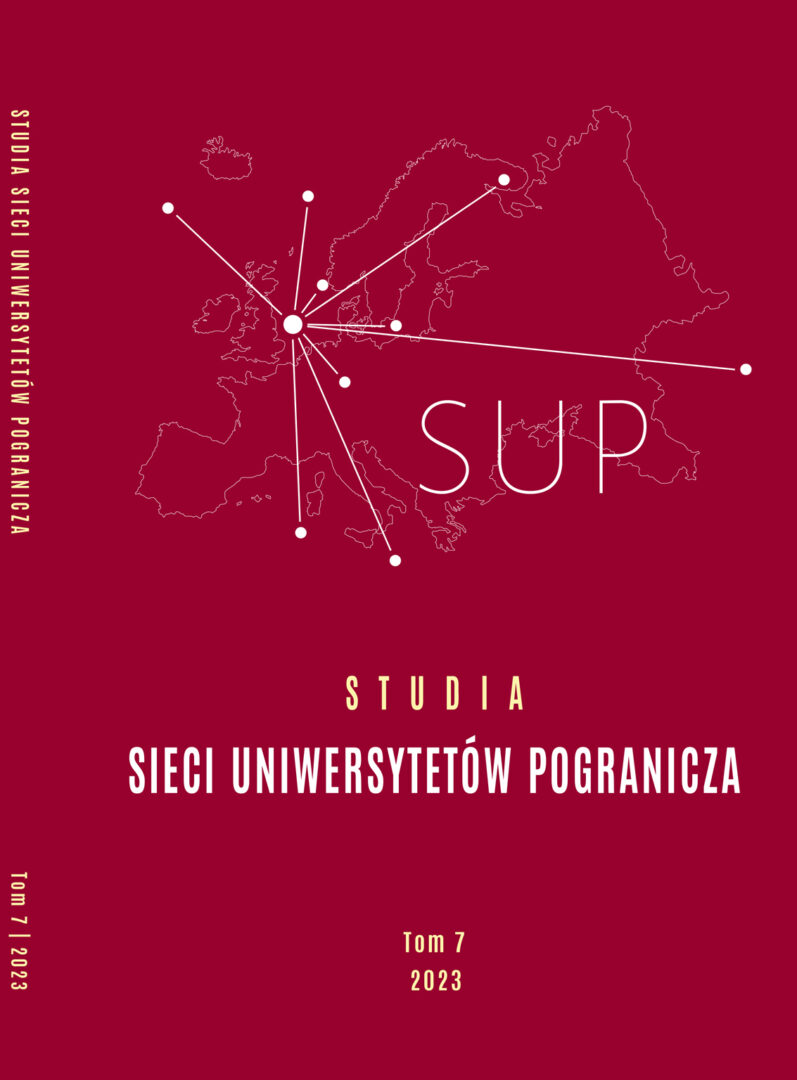ISSN: 2544-5790 DOI: 10.15290/sup
Studies
of BUN
The Studies of the Borderland Universities Network
The international scientific journal published once a year by the University of Bialystok, since 2017. The Studies are a platform for the exchange of contemporary scientific ideas of young and more experienced scientists from the Central and Eastern European and Central Asian countries, while maintaining high standards and principles of scientific integrity.
The Studies alternate between legal and economic issues. Scientific papers are published in English – official language of the United Nations. The Scientific Council and outstanding reviewers appointed by partner universities supervise the level of the journal. Reviews are carried out in the double-blind review system in accordance with the requirements of the Ministry of Science and Higher Education.
VOL. 7, 2023
Studies of the Borderland Universities Network
Author: Jarosław Matwiejuk (red.)
Year of publication: 2023
Number of pages: 310
Format: B5
ISSN: 2544-5790
DOI: 10.15290/sup

VOL. 6, 2022
Studies of the Borderland Universities Network
Author: Jarosław Matwiejuk (red.)
Year of publication: 2022
Number of pages: 249
Format: B5
ISSN: 2544-5790
DOI: 10.15290/sup

VOL. 5, 2021
Studies of the Borderland Universities Network
Author: Jarosław Matwiejuk (red.)
Year of publication: 2021
Number of pages: 189
Format: B5
ISSN: 2544-5790
DOI: 10.15290/sup

VOL. 4, 2020
Studies of the Borderland Universities Network
Author: Robert Ciborowski (red.)
Year of publication: 2020
Number of pages: 216
Format: B5
ISSN: 2544-5790
DOI: 10.15290/sup

VOL. 3, 2019
Studies of the Borderland Universities Network
Author: Jarosław Matwiejuk (red.)
Year of publication: 2019
Number of pages: 244
Format: B5
ISSN: 2544-5790
DOI: 10.15290/sup
The journal is indexed in the following databases:
Repozytorium Uniwersytetu w Białymstoku,
Agregator CEON,
BASE,
Google Scholar,
WorldCat,
CrossRef.
ICI Journals Master List – Index Copernicus
The SUP Studio magazine is published in open access. Creative Commons Attribution 4.0 International License.
Prof. dr hab. Mariusz Popławski (University of Białystok, Poland)
Prof. dr hab. Robert W. Ciborowski (University of Bialystok, Poland)
Prof. dr hab. Leonard Etel (University of Bialystok, Poland)
Prof. Dr. Tanju Tosun (Ege University – professor emeritus, Izmir, Turkye)
Prof. Dr. Ivan Biliarsky (Bulgarian Academy of Sciences, Sofia, Bulgaria)
Prof. Dr. Marko Jovanović (University of Belgrade, Serbia)
o. Univ.-Prof. Dr. Kurt Schmoller (University of Salzburg, Austria)
Prof. Dr. Jolanta Urbanovič (Mykolas Romeris University, Vilnius, Lithuania)
Prof. Dr. Ivan Biliarsky (Bulgarian Academy of Sciences, Sofia, Bulgaria)
Dr. Małgorzata Wenclik (Poland)
Editor-in-chief: Prof. UwB Dr Hab. Jarosław Matwiejuk (Poland)
Editorial secretary: mgr Piotr Białas, e-mail: sup@uwb.edu.pl (Poland)
Sending texts:
Authors are kindly requested to check that the text meets the criteria below.
- Texts that do not meet the editorial requirements may be rejected. The article size does not exceed 30,000 characters. The abstract is 1000-1500 characters with spaces. The article is prepared in accordance with the guidelines contained in the publishing template
- The abstract has been prepared in accordance with the guidelines included in the publishing template, ie it has clearly separated parts: Purpose; Test method; Score; Originality / Value
- The summary includes: keywords
- The application includes the ORCID of the Author (https://orcid.org/register).
- The application contains files with the following names: FILE_1_Name of the Author_Fragment of the article title; FILE_2_Text of the article without the data of the Author / Authors (article prepared in accordance with the publishing template). FILE_3_Data_Title fragment (Excel file). Charts, diagrams and tables are delivered in electronic version (Excel file named: FILE_3_Data), prepared in grayscale.
- The literature is listed alphabetically and includes only the works cited in the article.
Note: At the stage of submitting an article, i.e. when entering metadata, please add all Authors: names and surnames, e-mail addresses, affiliations.
1. Studies of BUN is a legal and economic journal, used to document scientific achievements and exchange views mainly on topics related to the methodology of legal and economic research.
2. Editors accept only original texts written in English, prepared especially for BUN Studies. Texts may take the form of scientific articles, research reports, reviews.
3. Articles should be sent by e-mail to the e-mail address sup@uwb.edu.pl. Along with the text, a scan of the signed documents should be sent (available on the Editorial Board’s website): license agreement, author’s declaration.
4. Texts sent to the Editorial Office should have clearly separated components (introduction, chapters, possible sub-chapters, summary, literature). It should be attached to them in English: abstract (including: purpose, research method, results, originality / value), keywords The author is obliged to provide: affiliation, e-mail address, ORCID.
5. Due to the current standards regarding the procedure securing the originality of publications (the so-called ghostwriting barrier), introduced by the Ministry of Science and Education for scientific journals, authors of articles submitted to Studies of BUN are obliged to:
– to disclose the contribution of individual authors to the creation of the publication (with their affiliation and contribution, i.e. information who is the author of the concept, assumptions, methods, protocol, etc. used in the preparation of the publication);
– to provide information about the sources of financing publications, the contribution of scientific and research institutions, associations and other entities (financial disclosure).
6. The text is eligible for publication on the condition that the reviewers have received 2 positive opinions. All articles published in SUP Studies are reviewed by independent reviewers, in accordance with the requirements of the Ministry of Science and Education. The rules for reviewing publications are available on the Editorial Board’s website.
7. Studies qualified for publication are subject to scientific editing and linguistic and technical proofreading. The editorial office reserves the right to change the titles and abbreviations, editorial corrections in accordance with the standards of the journal.
The title and abstract should be in English.
The text should be formatted according to the publishing template in a Microsoft Word compatible text editor. It should have clearly separated sections: introduction, chapters – possible sub-chapters, summary, literature.
The size of the article, including the bibliography, should not exceed 30,000 characters including spaces, and abstracts – 1,500 characters including spaces.
The summary should have clearly separated parts (in separate paragraphs): Purpose; Test method; Conclusions; Originality / Value / Implications / Recommendations (according to the template in the publishing template.
Keywords should contain important terms from the title and abstract (avoid general terms, plural terms and multi-word concepts; avoid “and”, “with”). Specific keywords can be found in Google Trends and Google AdWords.
Tables and figures should be prepared in accordance with the guidelines contained in the publishing template, attached at the stage of submitting the article to the editor (file named: FILE_3_Dane_FRAGMENT OF THE ARTICLE TITLE).
Footnotes in the main text and bibliography should be formatted in accordance with the guidelines contained in the publishing template.
Only works cited by the Author should be included in the reference list.
Bibliography should be written in alphabetical order.
License agreement (link)
Editors of the scientific journal BUN Studies complies with the Code of Conduct of the Publishing Ethics Committee in order to maintain the high quality of published articles and scientific integrity (COPE – Committee on Publication Ethics). All parties involved in the publication process (journal editors, author, reviewer) become familiar with the standards of ethical behavior.
Authors’ obligations
Authorship of the work
Authorship should be limited to those people who have made a significant contribution to the concept and implementation of research and the interpretation of published research results. Before submitting an article to the editor, make sure that all authors have been indicated and approved the final version of the text.
Ghostwriting and guest autorship, which are a manifestation of scientific misconduct, are considered to be violating ethical principles. Authors are obliged to indicate the contribution of individual persons to the creation of the text. For this purpose, an appropriate declaration is made available on the journal’s website.
We deal with ghostwriting when someone has made a significant contribution to the publication, but his role has not been disclosed or his role in the acknowledgments contained in the publication has not been disclosed.
We are dealing with guest authorship (“honorary authorship”) when the participation of a given person is negligible or did not take place at all, and yet he / she is given as the author / co-author of the publication.
Disclosure and conflict of interest
The author should disclose all sources of funding for projects in his work, contributions from research institutions, associations and other entities, and any material conflicts of interest that may affect its results or interpretation.
Text folding standards
Articles submitted to the journal may only be original works that do not infringe the copyrights of third parties and have not been published so far and have not been submitted to another publishing house. In the scientific text submitted to the editorial office using the author’s own research, the methodology of the conducted research should be discussed in detail. Apart from a scientific text, the author should provide the editorial office with raw data used in the work. It is unethical to make false or knowingly false statements.
The author should not publish material describing the same research in more than one journal or original publication. Submitting the same work to more than one editorial office of the journal at the same time is unethical and is not allowed. It is also considered unethical to submit a scientific article that is a translation of a text published or submitted to another journal.
Data Access and Data Maintenance
The author should provide or be ready to access raw data about the work submitted for review. Moreover, he should keep this data for one year from the moment of publication.
Errors detected after folding the text
If, after submitting the article, the author discovers an error or inaccuracy in the text, he is obliged to immediately notify the editors of this fact.
Originality and plagiarism
The author only submits the original work to the editorial office. He should ensure that the names of the authors cited in the work and / or excerpts from the works of the works cited are correctly quoted or mentioned. Plagiarism is treated as unethical and unacceptable behavior.
Any violations of the above-mentioned ethical principles constitute grounds for rejecting the article.
Responsibility for published texts
Impartiality
In the process of deciding whether to accept or reject a given scientific text, originality, scientific quality and consistency with the subject of the journal are important, not the author’s origin, nationality, ethnicity, political views, sexual orientation, gender, race, religion and others.
Confidentiality
Editors do not disclose data about authors to reviewers or data about reviewers to authors. Information obtained in the publication evaluation process, as well as rejected articles or their fragments, may not be used in own research by editorial board members or reviewers without the express written consent of the author.
Avoiding a conflict of interest
The editorial office does not appoint persons who are in direct reporting to the authors of the texts or in other direct personal relationships as reviewers.
Punctuality
A reviewer who is unable to review the manuscript at all or within the prescribed time limit should immediately inform the editorial secretary about it.
Objectivism
Reviews should be made: objectively, in accordance with ethical standards, based on scientific arguments, in order to increase the scientific value of the text. Personal critique of the author is considered inappropriate. Reviewers should clearly express their views, supporting them with appropriate arguments.
Confidentiality
All reviewed papers are treated as confidential documents. You cannot show them to other people, discuss them outside the Publishing College. Nor can they be used for personal gain by the reviewer.
Anonymity
All reviews are anonymous. The editors do not share the authors’ data with the reviewers.
Conflict of Interest
Reviewers should not review works in relation to which there is a conflict of interest resulting from the relationship with the author, company or institution related to the work.
Verification of the originality of the text
The reviewer should also inform the editorial secretary about the violation of ethical standards by the author of the text (if any), including any significant similarity, partial overlapping of the content of the reviewed work with any other published and known work, or any suspicion of plagiarism.
1. The Editorial Committee reviews the article in terms of its content and form. The initial internal assessment includes checking the compliance of the scientific study with the formal requirements made available to the Authors on the editorial website. At this stage, the article qualifies for the external evaluation stage or is rejected. The reason for rejection may be, among others, inadequacy of the subject matter to the journal’s profile, low quality of the text, lack of originality, poor quality of the bibliography. The qualification of an article is associated with the appointment of a thematic editor who has the appropriate knowledge and skills in a specific research area.
2. At least one independent reviewer is appointed to evaluate each publication.
3. Authors and reviewers do not know their identities (the so-called double-blind review process).
4. The review is in writing and ends with an unambiguous conclusion as to whether the article can be published or rejected.
5. The criteria for qualifying or rejecting the publication are available in the appendix.
6. The list of reviewers evaluating articles in a given year is published in the last issue of the journal and on the website. The names of the reviewers of individual publications or journal issues are not disclosed.
7. The editorial office emphasizes that “ghostwritting” (when someone has made a significant contribution to the creation of the publication, without disclosing his participation as one of the authors or without mentioning his role in the publication) and “guest authorship” (when the author’s participation is negligible) or did not take place at all, and yet he is the author / co-author of the publication) is considered a manifestation of scientific misconduct, and any detected cases will be unmasked.
Editorial office address:
ul. Świerkowa 20B
15-328 Białystok
e-mail: sup@uwb.edu.pl
website: sup.uwb.edu.pl
POLAND
Publisher:
Wydawnictwo Uniwersytetu w Białymstoku
ul. Świerkowa 20B
15-328 Białystok, Poland
e-mail: ac-dw@uwb.edu.pl
website: www.wydawnictwo.uwb.edu.pl
ISSN: 2544-5790
DOI: 10.15290 / sup
Current volumes of Studies of the Borderland Universities Network repozytorium.uwb.edu.pl



